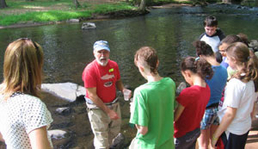
Saint Joseph Catholic Academy (SJCA) received a donation of the equipment and approximately 150 brown trout eggs needed to implement the Trout in the Classroom environmental education program for Grades Pre-K through Grade 8. “Every student will be participating in hands-on learning adventures in the science lab with the trout,” says Science Teacher, Marde Dimon. “They will raise trout from eggs to fry, monitor tank water quality, engage in river and stream habitat studies, learn to appreciate water resources, begin to foster a conservation ethic, and grow to understand ecosystems.”
When the trout eggs arrived, they were placed in a small hatching basket inside the cold water habitat in a 55 gallon aquarium located in the science lab. The habitat mimics the conditions of the Housatonic River. The tank has a digital thermometer connected to a chiller unit that keeps the habitat at a cool 50 degrees fahrenheit. A large and powerful filter unit creates a fast flowing stream of water and a compressor connected to an air stone introduces plenty of oxygen into the habitat. Pea gravel lines the bottom of the tank and simulates the riffle environment in the wild. All these conditions will be maintained throughout the school year to provide the best habitat for raising trout at our school.
“We anticipate that the trout eggs will hatch in 4-5 weeks. They will remain in their hatching basket until their nutritive sacs are gone at which time they will be lowered into their 55 gallon habitat and have plenty of room to swim and thrive,” explains Dimon. Students will feed the trout until they become fingerlings. Once the trout have reached fingerling stage they will be ready for release into the Housatonic River. Parents will drive their children to the boat launch at Lake Lillinonah on route 133 where each student will release one or two trout.
The program encourages students to learn how to observe, measure, collect data, create data tables and graphs, conduct water quality testing and engage in scientific inquiry and numeracy. Skills mastery will be met in the area of ecosystems, food chains and food webs, earth structure, earth’s features, habitat and the environment, human impact, animal studies, animal behavior, anatomy, scientific inquiry, chemistry, properties of matter, weather and climate, genetics and reproduction, technology and innovation, stream and river study and possibly field study.